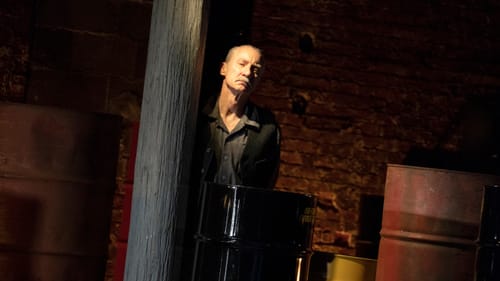Stay in the Loop
BSR publishes on a weekly schedule, with an email newsletter every Wednesday and Thursday morning. There’s no paywall, and subscribing is always free.
Will Blitzstein ever rock Philly?
Classic Stage Company presents Marc Blitzstein’s ‘The Cradle Will Rock’

Philadelphia took its sweet time claiming Marc Blitzstein (1905-1964) as a favorite son. The city erected a historical marker at the composer’s childhood home at 4th and Pine in 2017, some 53 years after his death. And for all my archival digging, I haven’t been able to find record of a major local production of The Cradle Will Rock, his magnum opus, at any point in the last 20 years.
Backstory of the staging
Interested parties who’ve passed Blitzstein’s placard in Society Hill and wondered about his artistic legacy must instead head to New York, where Classic Stage Company mounts a new staging of Cradle under the direction of Tony Award winner John Doyle. The show, written under the auspices of the Federal Theatre Project in 1937 and briefly shuttered by the government prior to its premiere, remains a rough piece of agitprop that won’t please all tastes. But it’s an important piece of US theater history, performed here by a top-flight cast of Broadway and West End veterans.
The fascinating story behind the musical’s abortive first production inspired the 1999 film Cradle Will Rock, which showed how Blitzstein and company (including young director Orson Welles) got around the restrictions placed on their artistic expression. To skirt the ban, the first performance featured Blitzstein singing the score on a bare stage, accompanying himself on piano. Members of the company eventually chimed in, singing their parts from the audience.
Rich and evil
Doyle, who also designed the production with assistance from David L. Arsenault, nods to that watershed event with his bare-bones set, which prominently features an imposing lone piano. (Various members of the company act as accompanist throughout the 90-minute performance.) It also features an abundance of oil drums, which make less sense but are used to create striking stage pictures, all evocatively lighted by Jane Cox and Tess James. Ann Hould-Ward’s grey uniform costumes allow the 10-person ensemble, all of whom play multiple roles, to segue effortlessly from workers to owners and back again, showing the tenuous connection between wealth and labor that Blitzstein—an avowed communist—sought to explore.
That exploration takes the form of quasi-Brechtian allegory, with characters given archetypal names (Doctor Specialist, Editor Daily, Larry Foreman) and broadly drawn motivations. The results can be crude and obvious—and so can certain elements of Doyle’s staging. Mister Mister (David Garrison), the corrupt boss of Steeltown USA, never appears without a stack of money in his hand; at one point, he fulfills a bribe to a crony by turning an oil drum over the man’s head and drowning him in dollar bills. We get it—he’s rich and evil.

A talented cast
The crass stage business clashes with Garrison’s actual performance, which is actually more subtle and carefully calibrated than I’ve seen in past productions. He presents Mister Mister as not a cartoon villain but a calculating, crushing capitalist—and in turn, his malicious dealings become even more chilling. This conception serves as a reminder that malice doesn’t always announce itself with grand gestures and mustache twirling; sometimes, it’s as simple as the cost of doing business.
The talented cast offer a handful of finely wrought performances that smooth some of the material’s rougher edges. Tony Yazbeck first breaks your heart as Harry Druggist, an honest shopkeeper undone by Mister Mister’s malevolence, then shifts easily into the firebrand role of Larry Foreman, who wants to unionize Steeltown.
Lara Pulver captures the agony and desperation felt by Depression-era workers in “The Nickel Under Your Foot,” perhaps the show’s most enduring number. Big-voiced Rema Webb verbalizes Blitzstein’s overarching message as the sister of a machinist killed in a workplace accident: “How many toiling, ailing, dying, piled-up bodies does it take to make you wise?”
Doyle’s strong production of Cradle makes its audience wise to the unheralded legacy of Marc Blitzstein. The composer wrote prolifically up until his murder, in a suspected gay-bashing, at the age of 58. (I’m a particular fan of his musical adaption of Sean O’Casey’s Juno and the Paycock.) How long before Philadelphia audiences get the chance to experience his work on one of our stages?
What, When, Where
The Cradle Will Rock. By Marc Blitzstein, John Doyle directed. Classic Stage Company. Through May 21, 2019, at the Lynn F. Angelson Theatre, 136 E. 13th Street, New York. (212) 677-4210 or classicstage.org.
The Lynn F. Angelson Theatre is an ADA-compliant venue. Wheelchair-accessible seating is available for all performances. Patrons who have mobility issues, who are blind or low-vision, or who may be attending the performance with a service animal are encouraged to contact the box office for additional assistance when purchasing their tickets.
Sign up for our newsletter
All of the week's new articles, all in one place. Sign up for the free weekly BSR newsletters, and don't miss a conversation.

 Cameron Kelsall
Cameron Kelsall